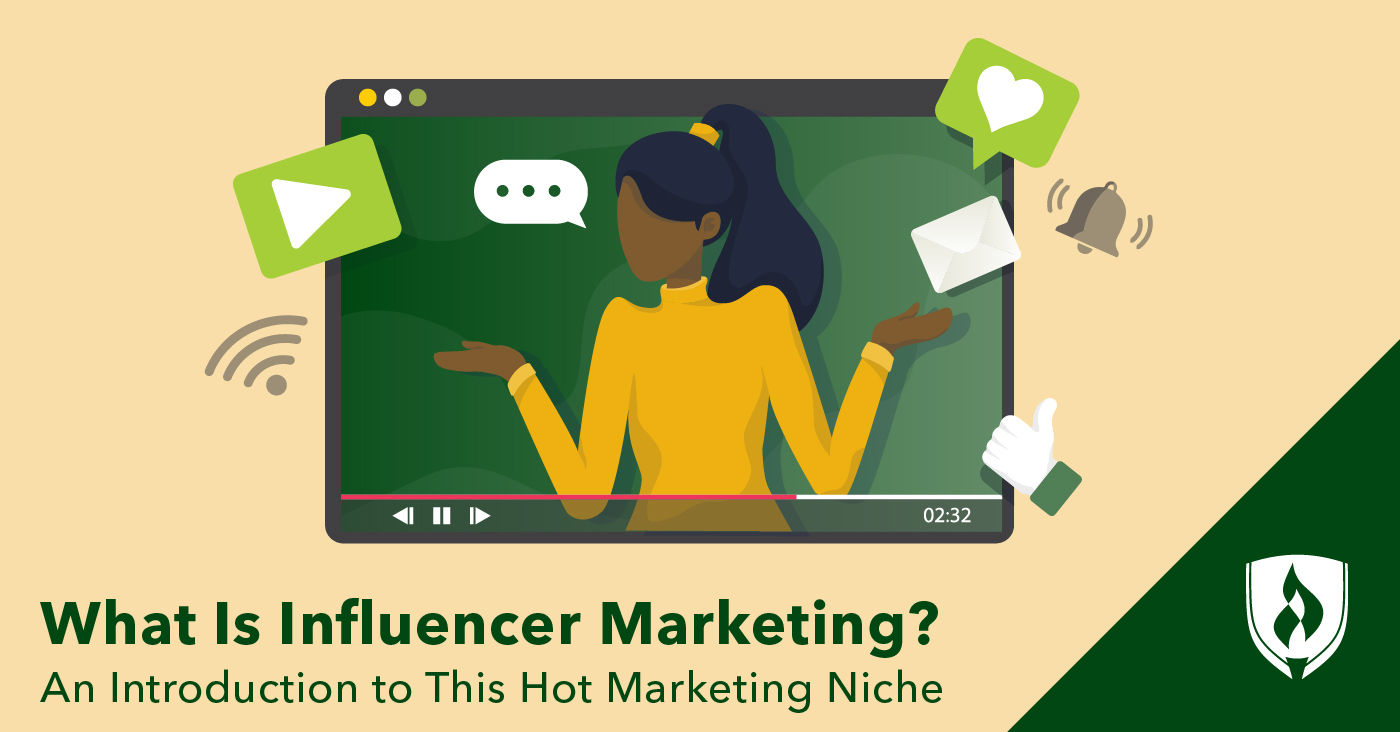What Is Influencer Marketing? An Introduction to This Hot Marketing Niche
By Carrie Mesrobian on 12/20/2021

Scrolling through your phone’s feed is practically an unconscious habit. While waiting in line, eating a meal, even lying in bed—living online has become the new normal. When having a portable, pocket-sized computer on hand 24/7 became achievable, the natural next step was for marketers to find ways to sell products and services in this digital space.
Facebook®, Instagram®, TikTok®, Twitter®, YouTube® and other social media platforms have given rise to the latest specialized approach to digital marketing: influencer marketing. You’ve likely seen content creators reviewing products, testing features or promoting services—and maybe even made a purchase or two yourself because of it.
But what has to happen before you can swipe up and order the next cool thing? We’ve talked to digital media marketing professionals to get you up to speed on what influencer marketing is and how it works!
Additionally, Check out What is affiliate marketing?
What is an “influencer?”
An influencer is any figure who has created a dedicated following through their internet presence. Blogging and social media platforms like Facebook, Instagram, TikTok, Twitter, YouTube and Twitch® are just a few examples of digital spaces where people have built followings based on common interests.
“In simplest terms, influencer marketing is having someone else tell your story for you,” says Joe Sinkwitz, CEO of Intellifluence. “It is the modern day, digital equivalent to word-of-mouth.”
Influencers create their audience not just through making content—blogs, videos, community discussions, livestreams, photos and graphics—but also by personally engaging and connecting with people around the content. There are influencers with followings on every topic imaginable, though skincare and makeup, parenting, fitness, and clothing and fashion are some popular influencer areas.
In the past, celebrity endorsements were often a popular way for brands to promote their products or services—so how’s this anything new? While some celebrities also work in the influencer space, they are not necessarily the same thing, says Sharon Van Donkelaar, chief marketing officer at Expandi.
“An influencer is someone with a massive online presence that has worked and crafted an audience that not only cares about their content, but also trusts and believes their opinions over the matter,” Donkelaar explains. “An influencer can be a photographer, a makeup artist, a movie reviewer, even someone who talks about plants!”
Part of the appeal is that often influencers are closer to being the “average Joe” than a celebrity. For some, that lends a level of credibility to their endorsements you wouldn’t find with a basketball star pushing fast food cheeseburgers in a commercial.
How does influencer marketing work?
“There are actually a variety of ways influencer relationships work,” says Sinkwitz. “But the most common [approach] is that a brand will reach out to a potential social media user or blogger with the intent of getting a product or service review, a piece of content shared, engagement on an existing post or brand messaging placed.”
Ashley Lands, founder of Stuff Oui Love and a former influencer herself, explains how the process can go from either direction—either from the company or from the influencer.
“A brand will reach out to an influencer and tell them that they would like them to post, share or create content for their brand,” Lands says.
Alternatively, an influencer will reach out to a brand and see if they are currently hiring.
“The influencer will pitch the brand on why they believe their audience would be interested in the brand, and then share examples of the types of content that they create,” Lands adds.
Once a mutual interest is established, both parties will hash out an agreement over important details like usage, terms, post frequency and more. Another important guideline: influencers in social media spaces must make clear when they have entered into a paid or sponsored relationship with a company or organization.
“Influencers are generally free to form their own opinions about products,” says Matt Weber, founder of Weber & Co. “But they must outline any financial arrangements that have been made if they wish to discuss them in their social media content.”
Influencers receive financial compensation for their work with a brand. Depending on the terms of their agreement, they may receive payment based on the number of referred sales, followers gained, views or other engagement metrics. Additionally, some influencers are offered free products or discounts as a form of compensation.
What are the most successful types of products or services in influencer marketing?
Lands believes that influencer marketing is best suited to certain kinds of physical products.
“You have to think about the average time someone spends looking at a post,” Lands says. “No one is going to understand a complicated product or service in 3 seconds, but they will know they just have to have that handbag she's holding.”
Fashion, beauty, and food and beverage are major players in the influencer marketing space, but there is really no limit as to what an influencer can promote.
“From my experience, this type of marketing works best for promoting products and services with a large target audience and geography,” says Kate Parish, chief marketing officer at Onilab. “Cosmetics, clothing, baby products, computer technology, food.”
While there may be exceptions found in extremely niche interests, many of the products in the categories above have an immediate “I need that now” effect. Things that sell themselves at a glance or with a quick demonstration win out.
Philip Pasma, president of Asterisk Marketing, believes food is popular in the influencer space because of the explosion of cooking shows and channels. “Food recommendation is something that can highly influence people, and the trend of eating out is ever on the rise,” Pasma adds.
Finding the right influencer
If a company is interested in using an influencer, conducting market research is usually the first step in discovering what type of audience the influencer has.
“A large following is one of the most important factors in whether or not an influencer will be attractive to brands,” says Paula Glynn, director of search marketing and digital strategy at Pixelstorm. “Companies will often research as much as possible about the influencer's audience and that influencer's content.”
Follower numbers aren’t the only factor to consider. Glynn also considers the quality of the influencer’s content, particularly if it offers attractive or unique features from others in the same industry.
“Customers will engage more with content when they feel like they’re learning about something new and different,” Glynn says.
Millie Henderson, director of PR and influencer relations at Surge Marketing Solutions, advises marketers to not overwhelm a potential influencer with your marketing pitch materials.
“It’s important to keep your brief short and simple,” Henderson says. “Be approachable and friendly; they are still humans, after all!”
What are the potential risks of influencer marketing?
While tapping into the built-in audience of an influential social media personality can certainly be a beneficial approach, it’s not without risks for brands.
Henderson notes that follower counts inflated by fake accounts pose a big risk for brands.
“If an influencer has 100,000 followers but only 100 likes per post, they’re probably bots,” cautions Henderson.
What’s more is that sophisticated bot networks can also automatically like, share and comment on content—so tying compensation and incentives to these metrics may be unwise. Brands and marketers need to think through the ways people could behave unethically in order to get a leg up.
Another risk involves the influencer’s content not interacting with the brand as desired or even damaging the brand’s reputation.
“There are high chances that the influencer might not get the message across effectively,” says Cale Loken, CEO of 301 Madison Consulting. “The influencer can fail to communicate that the product being promoted is sponsored.” This failure can be due to algorithm changes—where the content becomes hidden from the intended audience—or just due to poorly executed posts.
The very popularity of influencer marketing is another ironic challenge to using this promotional tactic, according to Steve Pogson, founder and strategy lead at First Pier.
“A decade ago, influencer marketing was confined to superstars and a handful of devoted bloggers,” Pogson says. “Now, it appears as though we've seen social media influencers grow in popularity, saturate the market and even become involved in fraud.”
Despite these challenges and risks, a benchmark report from Influencer Marketing Hub predicts this field to grow in worth to $13.8 billion in 2021.1
Why influencer marketing continues to grow
Paige Arnof-Fenn, founder of Mavens & Moguls, sees influencer marketing as a response to the public’s weariness with advertising in general, no matter how fancy and well-done the promotions look.
“Customers are savvy today,” Arnof-Fenn says. “They are happy to buy what they want and need, but they do not like to be sold things.”
Sinkwitz agrees, saying that this field will continue to grow as people grow to rely on the type of word-of-mouth or friendly recommendation influencer marketing offers, not just in the current business-to-consumer (B2C) space, but also business-to-business (B2B).
“For 2022 and beyond, B2B will also be a growing segment, especially within LinkedIn® and Twitter, as busy professionals seek recommendations from their peers,” Sinkwitz says.
Is a marketing career in your future?
Now that you’ve learned more about the social media-centric world of influencer marketing, perhaps you’re wondering what other marketing specializations are out there. Expand your knowledge and learn more about all the different approaches you can pursue with a Marketing degree in our article “11 Types of Marketing Specializations: The Practical Guide.”
1Werner Geyser, “The State of Influencer Marketing 2021: Benchmark Report” Influencer Marketing Hub. August 18, 2021. [accessed October 2021] https://influencermarketinghub.com/influencer-marketing-benchmark-report-2021/
Twitter is a registered trademark of Twitter, Inc.
Instagram is a registered trademark of Instagram, LLC.
Facebook is a registered trademark of Facebook, Inc.
TikTok is a registered trademark of Bytedance, Ltd.
YouTube is a registered trademark of Google, LLC.
LinkedIn is a registered trademark of LinkedIn, Inc.
Twitch is a registered trademark of Twitch Interactive, Inc.




